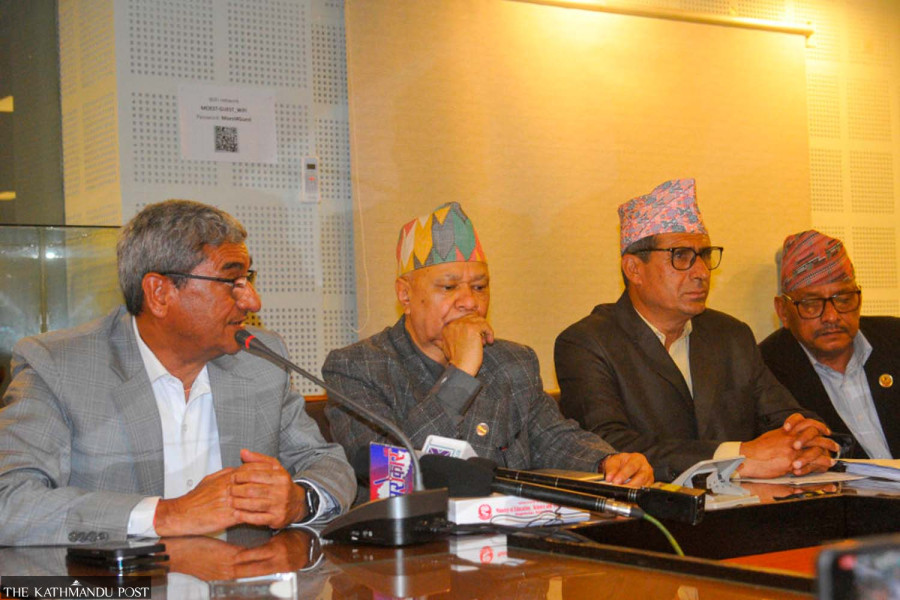National
Teachers end protest after Cabinet agrees to key demands
Government promises to pass new school education law by June 29. Teachers warn of a new stir if pledge broken.
Binod Ghimire
After marathon negotiations, the government and the agitating teachers on Wednesday reached a 9-point deal, prompting the teachers to call off their protest.
The Nepal Teachers’ Federation ended its month-long protest after the Cabinet, based on the negotiations, decided to implement their nine-point demand—mainly related to increment of teachers’ pay and benefits—and the chief whips of the major parties and the chair of the Education Committee of the lower house, committed to get School Education Bill endorsed by June 29.
Following long meetings over three days, the education minister-led government panel on Wednesday evening agreed to implement nine demands presented by the federation.
Subsequently, the Cabinet decided to implement them. In a separate deal, Ammar Bahadur Thapa, chairperson of the Education, Health and Information Technology Committee of the House of Representatives, Nepali Congress chief whip Shyam Ghimire and Mahesh Bartaula, the CPN-UML chief whip, committed to endorsing the bill from the House of Representatives by June 29.
“We have decided to suspend the educational strike from today [Wednesday] following the Cabinet’s decision to implement our demands and commitment from the major parties as well as chair of the education committee to get the bill endorsed by June 29,” said federation chair Laxmi Kishor Subedi at a press meet. “We urge all the teachers to start student enrollment campaigns and resume pending examinations immediately.”
Prior to his address, Education Minister Raghuji Pant read out the Cabinet’s decisions which include the provision of medical treatment for teachers and school staff at the Civil Service Hospital in Kathmandu at subsidised rates.
As demanded by the federation, it has decided that all temporary teaching and school staff—including relief quota teachers, temporary, contract-based, former lower secondary, learning grant-based, technical stream and special education teachers, as well as early childhood development (ECD) facilitators—would be paid for their accumulated leaves as a lump sum upon retirement. But going against the federation’s demand, the Cabinet has not specified their salaries.
Adjustment of the salaries of ECD facilitators and non-teaching school staff, providing rural allowances to temporary teachers and staff, revision in the education regulations to include teachers and staff—right now paid through internal resources of community schools—in contributory Social Security Fund scheme are the other decisions the KP Sharma Oli Cabinet made on Wednesday evening.
The government also agreed on the payment of grades to primary-level third-grade teachers, primary-level second-grade and lower secondary third-grade teachers as well as secondary first-grade teachers on par with civil servants, and to include teachers in the official order or precedence.
In addition to adjusting the salaries and benefits of lower secondary level first-grade teachers on par with secondary-level second-grade teachers, the Oli administration also agreed to provide free treatment to the teachers injured during a clash with police during their demonstration.
As many as 62 teachers and a journalist were injured earlier this week when the police intervened as teachers tried to enter restricted areas during their protest.
“Implementation of the teachers’ demands will put an additional Rs8 billion burden on state coffers,” Pant said at the press meet.
Stating that promulgation of the School Education Act is their primary demand, the teachers’ leaders have warned of stern protests if Parliament doesn’t endorse legislation within the committed deadline. “We believe the commitment will be honoured by the deadline. If it isn’t, the federation will start sterner protests,” said Subedi.
There are two months for Parliament to endorse the bill, which was registered in September 2023. Currently, a sub-panel under the Education Committee is trying to forge consensus on the bill, which has drawn 1,758 amendment proposals from 161 lawmakers. It has until Sunday to submit a report to the full committee. The bill will be tabled in the lower house for endorsement after it gets through the full committee.
United under the federation, thousands of teachers started Kathmandu-centric protests on April 2 demanding an immediate enactment of the Act incorporating the issues agreed with successive governments in the past.
They not just boycotted teaching, but also refused to evaluate the answer sheets of the Secondary Education Examinations and to conduct grade 12 examinations. The academic session that was supposed to commence on April 16 too was pushed back.
Due to the protest, the grade 12 national board has been postponed till May 4.




 22.58°C Kathmandu
22.58°C Kathmandu













.jpg&w=300&height=200)

